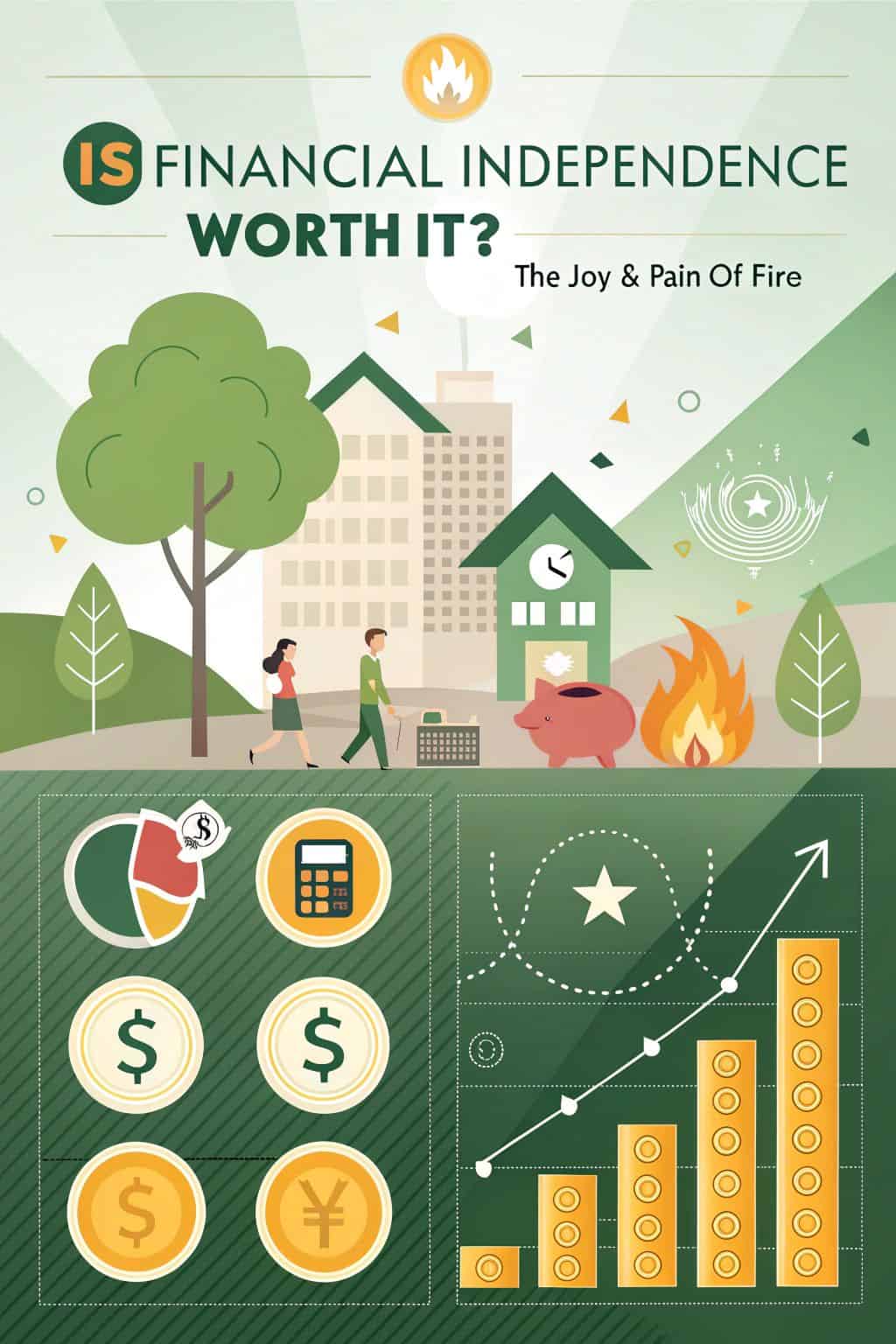Many people ask, “Is financial independence worth it?” after seeing friends quit jobs and travel the world. A recent study shows four in ten Americans doubt they’ll reach financial independence in the next five years.
This blog post breaks down the real benefits and struggles of the FIRE (Financial Independence, Retire Early) life. Money can’t buy happiness, but smart choices can buy freedom.
Key Takeaways
Financial independence requires saving 25 times your yearly expenses, with most people needing multiple income streams like real estate crowdfunding and index funds to reach this goal.
Four in ten Americans doubt they’ll achieve financial independence within five years, showing how challenging the FIRE path can be despite its benefits of time freedom and reduced stress.
The journey demands tough trade-offs like living below means, driving older cars, and moving to cheaper areas. Yet 59% of people still face surprise medical bills, and 49% experience unexpected job losses.
Successful FIRE followers share key traits like self-discipline, patience, and natural saving habits. They often use platforms like Fundrise, which manages $3.2 billion for 380,000 investors seeking passive income.
Life after reaching financial independence brings positive changes through regular vacations and less money stress. However, it doesn’t solve all problems, as shown by Financial Samurai’s insights about persistent money fears even after hitting financial targets.
Table of Contents
Understanding Financial Independence

Financial independence means having enough money to live without needing a regular job. You’ll reach this sweet spot when your investments and passive income cover all your basic costs, plus some extra cash for fun stuff.
What does financial independence mean?

Financial independence means your passive income covers all your basic living costs. Most people need a nest egg worth 25 times their yearly expenses to reach this goal. Your investments, real estate, and other income sources pay for your food, housing, and daily needs without you working a regular job.
Money gives you the power to live life on your own terms. – John Rampton
Living with financial independence brings true monetary freedom. You don’t need to stress about bills or depend on a paycheck. Many folks achieve this by mixing smart investing, like when you open a retirement account, with real estate deals.

The best part? You get to choose how to spend your time. Whether that means traveling the world, starting a business, or spending more time with family – the choice becomes yours to make.
The difference between financial independence and financial freedom

Many people mix up financial independence with financial freedom, but they mean different things. Living with financial independence means you still need to watch your money and make smart choices.
You must track your expenses, manage investments, and stick to a budget. Money management stays a key part of your life, even after you reach your goals.
True financial freedom goes beyond independence. It means money stops being a daily worry. People with financial freedom don’t stress about their net worth or living expenses. They can spend without checking their bank accounts first.
The path to independence needs careful planning and some sacrifices along the way. Your personal finance goals shape which path fits you best. Some folks aim for Budget FIRE with basic needs met, while others want Blockbuster FIRE with luxury choices.
Each level brings its own mix of benefits and trade-offs for your work-life balance.
The Benefits of Financial Independence

Financial independence gives you the power to wake up each day without an alarm clock, ready to chase your dreams instead of rushing to work. Your stress melts away when you know your bills are covered, your investments are growing, and you can spend time doing what matters most to you, like scuba diving with your dive buddy or working from home on projects you love.
Increased control over your time

Time freedom stands as the biggest reward of reaching financial independence. You’ll gain full control over your daily schedule without answering to a boss. Many folks who work from home still face strict deadlines and meetings.
True financial independence lets you decide how to spend each hour of your day.
Your days become yours to shape once you build enough wealth through stocks and index funds. You can pursue hobbies like scuba diving, start a passion project, or spend more time with family.
Time is the only luxury we can’t buy more of, but financial independence helps us own what we have.
The stress of rushing to morning meetings or working late vanishes. This newfound freedom also brings mental clarity to focus on what matters most. Next, we’ll explore how financial independence allows you to chase your dreams without money holding you back.
The ability to pursue your passions
Financial independence creates a clear path to chase your dreams without money holding you back. Many guys feel stuck in jobs they hate, but stealth wealth and smart financial planning can change that.
Your passions might include starting a business, learning new skills, or exploring the world. Financial security gives you the freedom to take risks and try new things.
Living life on your own terms becomes possible through careful retirement planning and wealth management. You’ll have the power to spend days doing what fires you up instead of watching the clock at work.
Most men find greater satisfaction in life once they break free from the daily grind. The ability to focus on personal interests creates opportunities for real growth and meaningful experiences.
Reduced financial stress
Money stress keeps many people up at night. I used to check my bank balance daily, worried about making ends meet. Now, with proper finances in place, I sleep better. My thoughts don’t circle around bills or mortgage payments anymore.
The peace of mind from having enough savings feels amazing.
Living without money worries creates space for better things. Social security and investments provide steady income streams. My tax-deferred accounts grow steadily each year. I spend less time thinking about money and more time doing what I love.
The mental freedom lets me focus on relationships and personal growth. Moving forward, this reduced stress opens doors to pursue your true passions with confidence.
Improved quality of life
Less stress leads to a better life. Financial independence brings real changes to daily living. You’ll drive a reliable mid-range car without monthly payments. Your home becomes a place of comfort, not a source of mortgage anxiety.
Taking one or two nice vacations each year feels natural, not forced.
Life gets sweeter with smart choices about time and cash. You pick activities that matter to you, free from work deadlines. Your annual returns from bonds and real estate crowdfunding create steady income streams.
Mid-range spending habits let you enjoy life without going overboard. You focus on what brings joy, not just what pays the bills.
The Challenges of Achieving Financial Independence

The path to financial independence demands tough choices, like skipping fancy dinners, driving older cars, or living in cheaper areas, but these short-term trade-offs can lead to amazing long-term rewards – read on to learn how you can make these smart money moves work for you.
The sacrifices required
Financial independence demands tough choices. Most people must live on less money, skip fancy dinners, and pass on new cars. I moved to a smaller house in a cheaper area to save more cash.
Many folks put off having kids or choose not to have them at all. Living below your means feels hard at first, but it gets easier with time.
Reaching early retirement means saying “no” to things others take for granted. My friends often hit the bars or buy new gadgets, while I invest that money instead. Some people relocate far from family to areas with lower cost of living.
Others give up high-paying jobs in big cities for simpler lives. These trade-offs feel real, but they serve a bigger goal of breaking free from the daily grind.
Dealing with uncertainty and risks
Making sacrifices leads to new risks on your path to freedom. Life throws curveballs at your money plans. The data shows 59% of people got hit with surprise medical bills they didn’t plan for.
Job security isn’t guaranteed either – 49% lost their jobs unexpectedly. These numbers prove why you need strong backup plans to attract money in tough times.
Smart guys protect themselves against inflation and market swings. They buy life insurance to shield their families. They spread cash across real estate crowdfunding and backdoor Roth IRAs.
The goal is to build different income streams that can handle economic shifts. Medicare costs keep rising each year, too. Your retirement math must account for higher future expenses.
Being bullish about markets helps, but having backup plans matters more.
Navigating lifestyle changes
Life changes hit hard after dealing with risks. Financial independence brings major shifts in daily habits. I learned to say “no” to costly lunch invites and weekend concerts. My friends kept asking why I stopped joining their expensive outings.
The path to economic independence taught me to find joy in free activities like hiking and home-cooked meals.
Living with less became my new normal. My old spending habits on Spotify premium and fancy dinners had to stop. I focused on what truly motivates me rather than material things. My coworkers got laid off while I built a safety net through real estate crowdfunding.
Simple living helped me save more and stress less about money. The lifestyle shift felt tough at first, but the freedom it brought was worth every sacrifice.
The Dark Truths of Financial Independence

Financial independence carries some harsh realities that many people don’t talk about. Money freedom won’t fix your inner struggles, and the path often includes tough choices about capital gains, valuations, and real estate crowdfunding that can make you question if it’s all worth it.
It’s not a guaranteed destination
The path to financial independence offers no promises. Many folks chase this goal with high hopes, but life throws curveballs at every turn. Real estate crowdfunding and capital gains might look great on paper, but markets change fast.
I learned this hard lesson in 2008 when my valuations dropped by 40%. As Clint Eastwood said in “The Rookie”:
If you want a guarantee, buy a toaster.
Your tax brackets might shift, and cost of living adjustments can eat into your savings plan. Success stories of young FI achievers make headlines because they’re rare, not common.
Most people take decades to build wealth, facing setbacks along the way. The road gets bumpy with market crashes, health issues, or family needs. Let’s talk about the mental challenges that come with this uncertain path.
It may not solve all your problems
Money alone won’t fix your life problems. I discovered this after reaching my financial goals through real estate crowdfunding platforms like Fundrise. Sure, I had more cash flow and freedom, but my personal struggles remained.
Financial independence didn’t automatically solve my stress, relationship issues, or health concerns. Many people still face daily challenges with purpose and meaning, even with substantial bank accounts.
Life’s real costs go beyond simple cost of living adjustments. Financial Samurai notes that fear of not having enough money persists, even after hitting big financial targets. You might replace money worries with new concerns about how to spend your time or find meaning.
Your next focus should be on building strong relationships and finding ways to grow as a person. The connection between personality traits and financial independence success shows interesting patterns.
You’ll need to be comfortable with discomfort
Living with less creates real discomfort at first. I had to give up my daily coffee runs and fancy gym membership to reach my financial goals. The path to financial independence requires tough choices, like saying no to group dinners or skipping the latest gadgets.
These small sacrifices feel hard, but they build strength over time.
Getting comfortable with discomfort means changing your mindset about spending. Your friends might keep buying new cars or taking luxury vacations with net jets, while you focus on real estate crowdfunding and basic cost of living adjustments.
The reason many people fail at financial independence is their inability to accept these temporary trade-offs. Making peace with a simpler lifestyle opens doors to greater financial freedom.
Here are the three main levels of financial independence and how they might fit your goals.
Is Financial Independence for Everyone?

Financial independence works better for people who love planning and can stick to their goals. Some folks thrive on the strict budgets and real estate crowdfunding needed for FIRE, while others find the lifestyle too rigid for their cost of living adjustment needs.
Personality traits that align with financial independence
Specific personality traits make the path to financial independence smoother. People who reach their money goals share common traits that help them stay focused and committed.
- Self-discipline masters excel at financial independence. They stick to budgets, avoid impulse buys, and save money like clockwork, even with rising cost of living adjustments.
- Patient investors understand wealth takes time. They stay calm during market swings and focus on long-term growth through diverse options like real estate crowdfunding.
- Natural savers prefer simple living. They find joy in basic pleasures rather than fancy stuff, making it easier to build wealth.
- Math-minded folks track numbers well. They love spreadsheets, calculations, and watching their money grow through compound interest.
- Independent thinkers ignore peer pressure. They skip trendy purchases and stick to their financial plans without feeling left out.
- Goal-focused people stay on target. They map out clear money goals and work steadily to reach them.
- Lifelong learners study money matters daily. They read books, take classes, and learn from others’ success stories.
- Adaptable souls handle change well. They adjust their plans as life shifts and stay flexible with their spending.
- Risk-aware individuals balance safety and growth. They research choices carefully before investing their cash.
- Determined spirits push through tough times. They keep going even when saving feels hard or markets drop.
Common misconceptions about financial independence
Strong personality traits help build financial independence. Many people have wrong ideas about what it takes to reach this goal.
- Financial independence means never working again. False. Many financially independent people choose to work on projects they love. Real estate crowdfunding and other passive income streams still need active management.
- You need a huge salary to reach financial independence. Wrong. People with average incomes can reach this goal through smart spending and saving habits. Cost of living adjustment planning matters more than a big paycheck.
- Financial independence happens overnight. Not true. The path requires years of consistent effort and money management skills.
- Only single people can achieve financial independence. Incorrect. Couples and families can reach this goal together through shared values and planning.
- You must live like a hermit to save money. False. Smart budgeting lets you enjoy life while building wealth. Balance matters more than extreme saving.
- Financial independence means having millions in the bank. Wrong. The amount needed varies based on lifestyle and location. Some achieve it with less through careful planning.
- You can’t start late in life. False. Starting later means adjusting goals and strategies, not giving up the dream.
- Financial independence solves all life problems. Incorrect. Money freedom helps but doesn’t fix personal or emotional challenges.
- The path to financial independence is the same for everyone. Wrong. Each person needs their own plan based on goals and circumstances.
- You must know everything about investing first. False. Basic investment knowledge grows over time through learning and practice.
Key Strategies for Achieving Financial Independence

Getting to financial independence needs a clear money plan, and smart moves with real estate crowdfunding can speed up your path. Your cost of living adjustment matters a lot, so you’ll need to track every dollar and create multiple income streams that grow while you sleep.
Budgeting and expense control
Strict budgeting forms the backbone of reaching financial independence. Smart men track every dollar spent and cut out wasteful expenses. Living below your means creates a solid path to building wealth.
A cost of living adjustment might affect your budget, but staying focused on essential spending helps reach goals faster.
Real estate crowdfunding offers one way to invest saved money, but first comes the vital task of controlling daily costs. The basic rule stays simple – spend less than you earn. Many successful FI seekers avoid buying luxury items they don’t need.
They skip unnecessary subscriptions and focus on value-based spending instead. Your next step after mastering budgeting involves learning smart investment strategies to grow your wealth.
Saving and investing
Smart budgeting leads to more money for saving and investing. Your path to financial freedom starts with putting aside at least 25 times your yearly costs. I put my first $1,000 into real estate crowdfunding last year, and now earn steady passive income each month.
The stock market offers a good mix of growth and income through low-cost index funds.
Building wealth takes both saving and smart investing choices. Most experts say you need investment returns between 2.5% to 5% to keep up with cost of living adjustments. My strategy focuses on maxing out tax-advantaged accounts first, then exploring other investment options.
Real estate and index funds form the core of my investment approach.
Building passive income sources
Building passive income takes effort, but the rewards make it worthwhile. Real estate stands as a top choice for steady cash flow, making up over 50% of successful passive income streams.
Platforms like Fundrise have made real estate investing easier, managing $3.2 billion for about 380,000 investors who want to grow their money. The cost of living adjustment keeps rising each year, so having multiple income streams helps protect your financial future.
Smart investors mix different passive income sources to create a strong money-making system. Real estate crowdfunding offers a simple way to start with small amounts of money. You can earn rental income without dealing with tenants or property repairs.
Many guys start with one passive income stream and grow it over time. The key is to pick something you understand and stick with it until it works.
Negotiating a severance to retire early
Leaving your job doesn’t mean walking away empty-handed. Sam Dogen from Financial Samurai proved this in 2012 when he retired at 34 with a solid severance package. Smart workers plan their exit through careful talks with their bosses about parting ways.
This step helps cover living costs during the shift to early retirement.
Your best shot at a good severance deal comes from showing your value at work. Start by listing your achievements and mapping out how to transfer your duties to others. Many companies offer better packages to loyal employees who help with smooth transitions.
A solid severance package can provide extra cash flow while your real estate crowdfunding investments grow. This money helps handle cost of living adjustments in your first years of freedom.
Life After Achieving Financial Independence

Life changes after reaching financial independence, with many people finding new meaning through real estate crowdfunding and other passive income streams. Your daily cost of living adjustment becomes less stressful, and you’ll discover fresh ways to spend your free time, much like aromantic relationships that focus on personal growth rather than traditional expectations.
How life changes after reaching this milestone
Financial freedom brings real changes to daily routines. Most folks start taking 1-2 vacations each year without guilt. They move to better neighborhoods with good schools and parks.
The stress of checking bank accounts fades away. Real estate crowdfunding becomes a fun hobby rather than a must-do investment. The cost of living adjustment doesn’t cause panic anymore.
Money stops being the main focus of your days. You’ll spend more time doing what makes you happy. Some guys pick up new hobbies or start small businesses. Others dedicate time to family or travel.
The aromantic appeal of chasing bigger paychecks loses its grip. Your next phase involves finding purpose beyond the numbers and helping others reach their goals.
The ongoing journey of financial independence
Life after hitting your money goals doesn’t mean you can stop managing your cash. Smart guys keep tracking their spending and stay on top of their investments. Real estate crowdfunding offers fresh ways to grow your nest egg, while cost of living adjustments push you to update your plans each year.
Your expenses might creep up as you earn more, so you’ll need strong habits to stay on track.
Making money work for you takes constant effort, even after you’ve built wealth. Many men find they must adjust their spending as prices rise. Some guys choose to work part-time or start side businesses to keep their skills sharp.
Others focus on growing their passive income through different investment channels. The key is staying flexible and ready to change your approach based on market conditions.
The importance of giving back and helping others
Financial independence opens opportunities to help others grow. Many FI achievers spend time teaching money skills to their communities. They start local workshops, mentor young professionals, or guide others through real estate crowdfunding.
The focus changes from making money to making an impact.
Giving back brings deep satisfaction and builds lasting connections. Smart FI folks understand that true wealth comes from lifting others up. They include cost of living adjustments in their plans to ensure they can keep supporting causes they care about.
This mindset creates a more balanced view of what success means after reaching financial goals. The real test of financial independence shows in how you handle the next phase of life.
The Three Levels of Financial Independence

Financial independence comes in different sizes, just like your favorite coffee order. You can pick the level that fits your goals, from living on a tight budget to enjoying a luxurious lifestyle with real estate crowdfunding and annual cola raises.
Budget Financial Independence (Lean FIRE)
Living on less than $40,000 a year marks the path of Budget Financial Independence, also known as Lean FIRE. People who follow this path live simple lives with basic needs met through careful spending.
My buddy Mike reached this goal with $800,000 in savings, which gives him about $32,000 yearly to live on.
Lean FIRE folks skip fancy cars and big houses. They focus on low-cost housing through real estate crowdfunding or small apartments in cheaper areas. The cost of living adjustment stays low because they cook at home, use public transport, and find free entertainment.
I’ve seen many guys make this work by sharing housing costs with roommates or moving to areas where their dollars stretch further.
Baseline Financial Independence (Regular FIRE)
Regular FIRE is the most common path to financial freedom. Most people aim to save around $1.7 million, which represents the typical range needed for independence. This amount provides about $68,000 per year, matching the average U.S. household income.
Real estate crowdfunding can accelerate this process by creating steady income streams.
Smart planning for cost of living adjustments maintains your money’s growth with inflation. My experience with FIRE shows that this level provides a comfortable middle ground. You won’t live like a king, but you’ll have enough to maintain a solid lifestyle.
Success comes from building diverse income sources that can withstand market changes while covering your basic needs plus some extras for fun.
Blockbuster Financial Independence (Fat FIRE)
Fat FIRE represents the most luxurious path to financial freedom. People who aim for Fat FIRE target annual spending of $250,000 or more, backed by assets of $5-12 million. This level lets you live in expensive cities, travel first class, and maintain a high-end lifestyle without money stress.
Real estate crowdfunding often plays a big role in building wealth at this level.
Living costs stay manageable through smart cost of living adjustments (COLA) each year. Fat FIRE followers keep their household income around $250,000-$300,000 during their working years.
They save aggressively while enjoying premium experiences and maintaining multiple homes. Most Fat FIRE achievers mix traditional investments with real estate to create strong passive income streams.
Is Financial Independence Worth It?

Financial independence brings both rewards and challenges, but the freedom to control your time and money makes the hard work worth it – read on to learn how real estate crowdfunding and cost of living adjustments can shape your path to financial success.
Evaluating the trade-offs
The path to financial independence demands tough choices. I had to skip fancy dinners and cut back on weekend trips with friends. My social life took a hit, but my savings grew faster than ever.
Living below my means felt hard at first. The real estate crowdfunding returns helped offset some lifestyle cuts. My monthly budget shrank by 40%, yet my investment portfolio grew steadily.
Making these trade-offs paid off big time. My cost of living adjustment became easier each month as I formed new habits. Sure, I missed some fun nights out, but watching my net worth climb gave me a different kind of joy.
The freedom to choose how I spend my time now means more than any luxury purchase could. My friends didn’t always understand my choices, but the peace of mind was worth every sacrifice.
Balancing financial independence with personal fulfillment
Moving beyond trade-offs, true wealth lies in striking a balance between money and meaning. Money alone won’t bring lasting joy – I learned this after chasing real estate crowdfunding deals for quick profits.
Finding happiness means spending time with family, pursuing hobbies, and building strong relationships. Cost of living adjustments might affect your financial plans, but they shouldn’t control your life choices.
Personal growth matters more than bank account numbers. Smart guys focus on both building wealth and nurturing their inner lives. My own path taught me to value experiences over stuff.
I now spend more time hiking, learning new skills, and helping others. These activities cost little but add huge value to life. Financial independence works best when it supports your personal goals, not the other way around.
People Also Ask
How does cost of living adjustment (COLA) affect my FIRE journey?
COLA plays a big role in your path to freedom, as it helps you plan how much money you’ll need each year, while keeping up with rising prices.
What role can real estate crowdfunding play in reaching FIRE?
Real estate crowdfunding offers a way to invest in property without buying whole buildings, making it easier to build passive income streams for your FIRE goals.
How much money do I need to reach FIRE?
Your FIRE number depends on your lifestyle and where you live, but you should factor in yearly cost of living adjustments (COLA) to make sure your savings last.
Is real estate a must-have in my FIRE plan?
While real estate crowdfunding can boost your income, it’s not required. Many people reach FIRE through different paths, like stocks or businesses, but real estate can speed up the journey.

